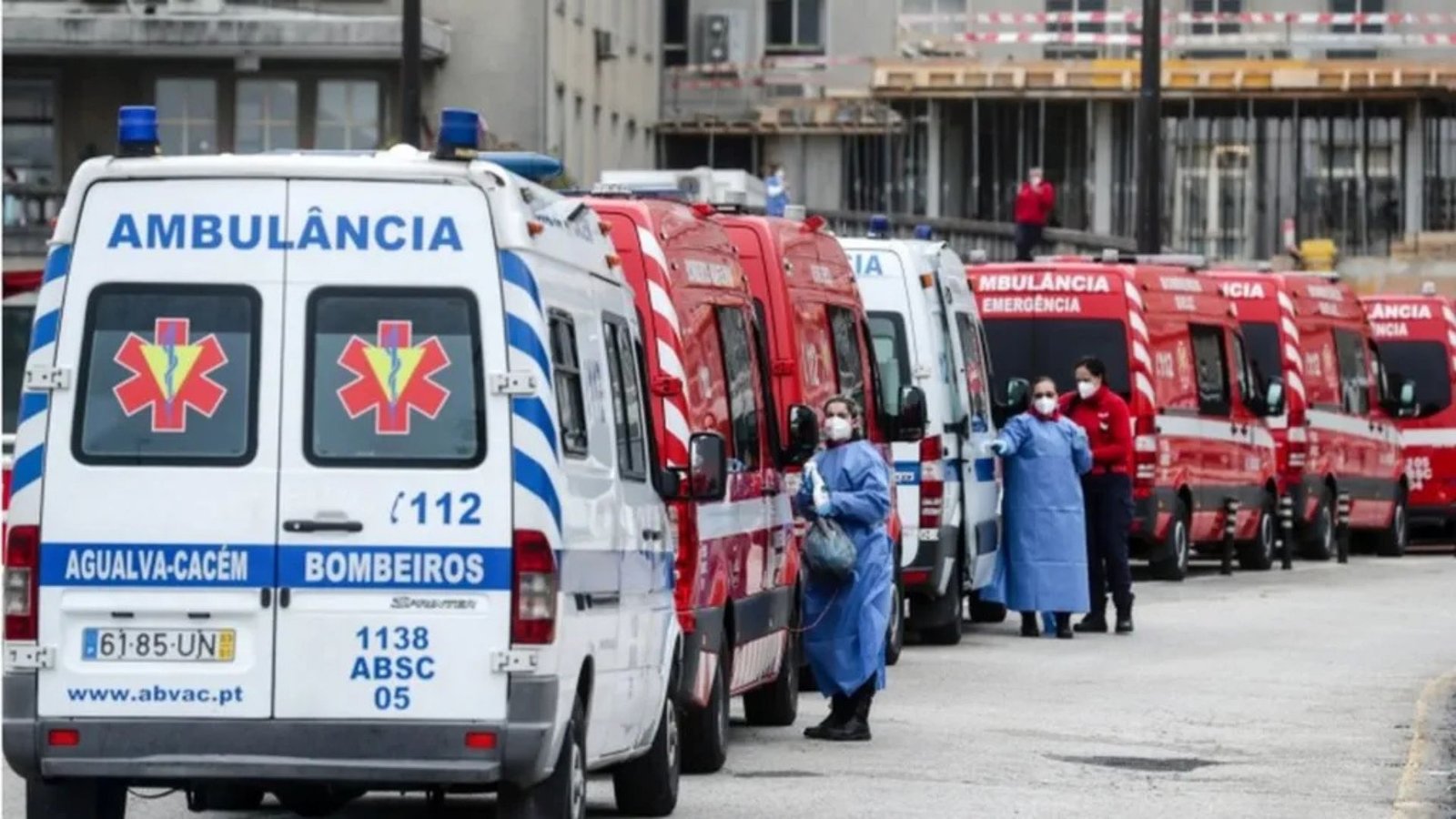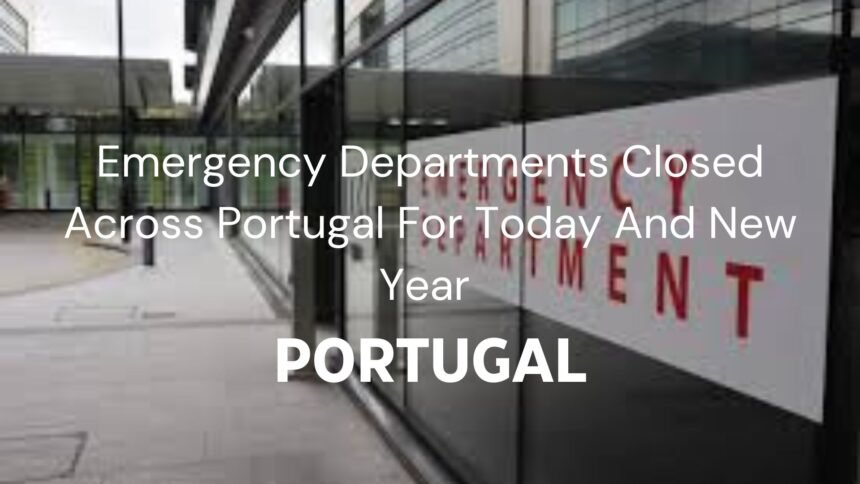Several emergency departments across Portugal are closed temporarily. The closures affect Gynaecology/Obstetrics, Paediatrics, and General Care. These closures will impact today and New Year’s Day. The National Health Service (SNS) has shared details about the affected hospitals. Citizens are advised to plan their visits carefully to avoid unnecessary delays or confusion.
Read More About: New Rules For Hiring Immigrants In Portugal: No Security Identification Number Required
Emergency Services Closed Across Portugal

The closures occur at a period of high demand on emergency services. This is challenging for hospitals to continue normal operations due to personnel shortages and rising holiday demand. This highlights the ongoing challenges within Portugal’s healthcare system.
Hospitals with Closed Departments
Some pediatric emergency departments are closed. These include:
- Hospital Beatriz Ângelo in Loures
- Torres Vedras District Hospital
- Peniche Hospital
Gynaecology and Obstetrics emergencies are not available at:
- Abrantes Hospital
- Caldas da Rainha District Hospital
Peniche Hospital’s general emergency department is also closed today.
On New Year’s Day, six emergency services will remain closed. However, Peniche Hospital will reopen. São João da Madeira Hospital will close its general and paediatric emergency services.
These closures underscore the need for citizens to remain informed. Hospitals are prioritizing critical cases and using limited resources to ensure care for those in urgent need. Patients should check ahead to avoid wasted trips.
Limited Services At Some Hospitals
Although 188 emergency services are open, many are operating with restrictions. For example, Gynaecology and Obstetrics departments at Garcia de Orta Hospital in Almada and São Bernardo Hospital in Setúbal are only accepting internal cases. Patients referred through the National Institute for Medical Emergencies (INEM) will also be attended to.
Hospitals in Lisbon, Cascais, Amadora-Sintra, Braga, Leiria, and Vila Franca de Xira have similar policies. These hospitals will only handle internal cases or those referred by INEM or the SNS 24 hotline. This helps to manage the workload while focusing on critical cases.
Such limitations are part of the broader strategy to balance patient loads. Hospitals aim to deliver effective care without overwhelming their staff and resources by focusing on referrals and internal cases.
Time-Based Restrictions At Some Hospitals
Some hospitals have time-specific restrictions. For example, Amadora-Sintra Hospital’s paediatric emergencies are closed from midnight to 8 am and again from 8 pm to midnight. On Wednesday, Beja Hospital’s general emergency will only handle referrals from 8 pm to midnight. These measures highlight the need to check availability before visiting.
Time-based restrictions allow hospitals to allocate staff more effectively. During off-peak hours, resources can be redirected to other pressing needs. Patients are advised to contact the SNS 24 hotline for guidance during these restricted times.
Importance Of The SNS 24 Hotline
The SNS Executive Board advises citizens to use the SNS 24 hotline before visiting any emergency service. The hotline provides updates on which services are open. It also guides people to the right hospital based on their condition. This saves time and avoids unnecessary trips.
Since December 16, pregnant women must call the “SNS Grávida” line before visiting Obstetrics and Gynecology departments. This is part of a pilot program in 11 Local Health Units, mainly in Lisbon and Vale do Tejo. Three other hospitals, including Gaia Hospital are also part of this program. It ensures pregnant women get the care they need efficiently.
The hotline is a vital tool for managing the current healthcare challenges. It helps to direct patients to available services while reducing the strain on overcrowded emergency departments.
Expansion Of SNS Grávida In January
The “SNS Grávida” initiative will expand in January. Local Health Units in the Setúbal Peninsula will join the project. These include Almada-Seixal, Arco Ribeirinho, and Setúbal. This expansion will make the service available to more pregnant women.
The program seeks to enhance prenatal care and guarantee pregnant women get timely support. The program is expected to reduce waiting times and enhance patient satisfaction. This reflects a commitment to better healthcare for vulnerable groups.
Tips For Navigating Emergency Closures
To deal with the temporary closures, here are some tips:
- Call the SNS 24 Hotline: Always check with the hotline before visiting an emergency department. They provide the latest updates and can guide you to an open facility.
- Plan Ahead: If you or a loved one needs regular care, find out which services are available.
- Follow Referral Advice: For non-urgent cases, speak with your primary care doctor or use INEM services. This ensures you receive proper care.
- Stay Updated: Keep track of official SNS announcements and local news for changes.
By following these steps, citizens can navigate the closures with less stress. Preparation and communication are key to receiving the care you need during this challenging period.
Why Are These Measures Necessary?
The closures highlight ongoing challenges in Portugal’s healthcare system. There are shortages of staff and resources. During busy times, these issues become more severe such as the holiday season. The SNS is trying to manage the situation with measures like the “SNS Grávida” line and telehealth services.
While these efforts help, the system needs long-term solutions. More investment, better staffing, and improved services are needed to meet growing demands. The government is working on these improvements.
Temporary closures also emphasize the importance of patient cooperation. Patients can help reduce strain on emergency services by using available resources wisely such as the SNS 24 hotline.
Temporary closures in emergency departments across Portugal show the importance of planning ahead. Citizens should use the SNS 24 hotline to check service availability. Initiatives like “SNS Grávida” are steps towards better healthcare access. People can get the care they need by staying informed and following guidelines even during challenging times.
The healthcare system is under pressure but with cooperation and careful planning, these challenges can be managed. The government and health services continue to work towards lasting solutions for better patient care.






